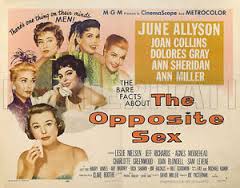
THE OPPOSITE SEX
US, 1956, 117 minutes, Colour.
June Allyson, Joan Collins, Dolores Gray, Ann Sheridan, Ann Miller, Leslie Nielsen, Jeff Richards, Agnes Morehead, Charlotte Greenwood, Joan Blondell, Sam Levene, Alice Pearce.
Directed by David Miller.
The Opposite Sex is a remake of the 1939 classic, The Women, George Cukor’s film of Claire Booth Luce’s play with dialogue by Anita Loos. The classic can stand by itself, even in the light of the 2008 remake.
1956 was the era of Cinemascope and colour, big screen treatment in remakes of classic films. And this was MGM, so music is added and a lot of songs, especially sung by June Allyson whose husky voice is an acquired taste, even though she was a petite actress of great energy and verve. There is a rather camp song with chorus girls including Joan Collins. And there is comedy turn with Dick Shawn and Jim Bacchus as a psychologist – very dated now.
One of the main features of The Women was that there was talk about me but no man appeared. This is not the case here, with quite a number of men including Kay’s husband, Stephen, played by Leslie Nielsen, something of a surprise to see him as a romantic hero after all his later comedies. There are husbands, agents, and Buck, Jeff Richards, a gigolo type from a hostel for divorcees in Reno who also has his musical number.
June Allyson was popular at the time and so acceptable in the central role. It is singer Dolores Gray, who made only a few films including Kismet and Designing Woman, who has the acid role of the gossip friend. She is usually accompanied by Joan Blondell, continually pregnant. Ann Sheridan is a playwright who is the confidante of Kay. Agnes Morehead turns up as the Countess with Ann Miller, not dancing, as another divorcee. Charlotte Greenwood is the proprietor of the hostel for the divorcees in Reno. The villain (Joan Crawford in the original) is a very young Joan Collins who was making her mark in Hollywood.
The main enjoyment comes from looking at the stars and listening to some of the waspish dialogue from the original. The film was directed by David Miller, who made brief films in the 1930s, moved to MGM and bigger budgets with Billy The Kid and was to direct such popular films as Sudden Fear with Joan Crawford.
1. A colourful film of the 50s? A remake of the classic 1930s films, The Women?
2. The use of the original film, the characters, situations, dialogue? Adapting it to the widescreen and colour of the 1950s? No men in the original, men in this version?
3. The addition of music, the songs, June Allyson and her singing, part of the plot to go back to the show, her recordings? The camp song and dance, the dancer and singer, the girls, the choreography? Harry James and his band? Dick Shawn and his comic song, Jim Bacchus as the psychiatrist? At the time? Now?
4. New York City, glossy treatment, the world of the wealthy, fashions, shops and beauty care, the theatre? Reno for the divorcees?
5. The themes of marriage, affairs, separation, divorce, the effect on the children?
6. June Allyson as Kay, her love for Stephen, Leslie Nielsen as Stephen (before his comic roles), happy marriage, the anniversary coming up, the party and the tension, the gossip, Kay hearing it from the beautician, upset, going away after the party? Amanda as her confidante and adviser? Sylvia and her interventions, gossip? Looking for Crystal, finding her, the encounter?
7. Sylvia, her gossip, her own marriage? The contrast with Edith and the other women? Edith and her continued pregnancies, her husband? Listening to the gossip?
8. Kay going away with Amanda, helping to understand the situation better? The scenes with her daughter, the daughter staying with Stephen? The decision to go to Reno, meeting Lucy, the other divorcees, Countess, Gloria – and her being the other woman with Sylvia’s husband? Buck, handsome but somewhat dumb, his escort role, the touch of the gigolo? Sylvia becoming involved with him? Kay resisting him?
9. The return to New York, Sylvia with Buck, Buck and his performance, the fans, Crystal setting her eye on him, his going along with her?
10. The character of Crystal, the work in the theatre, catty, discussions with her fellow-dancer, Pat? Setting her eye on Stephen, producer of the show, the phone calls, the dinner, his sending flowers? The encounters with Kay and the other women? Encounters with the daughter, the scene in the bath, the hostility?
11. The finale, at the restaurant, Kay deciding to go, her plan, the help of the columnist, Mike Pearl and his help, yet her love for Stephen? Exposing Crystal
and her relationship with Buck, humiliating Sylvia? Winning back Stephen?
12. The humour from the original film diluted for an MGM 50s musical?